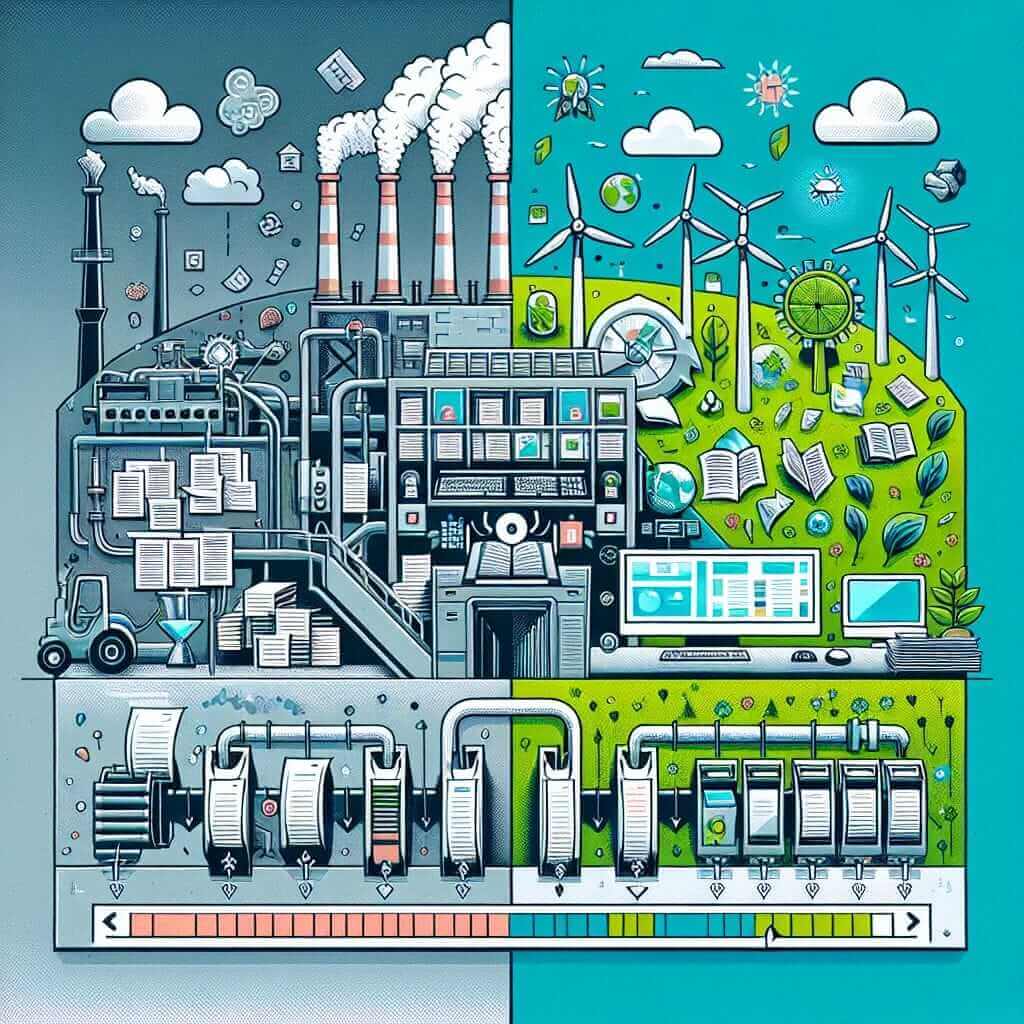The IELTS Reading test commonly includes passages on a wide range of contemporary issues. One such topic that has attracted attention is the impact of digital technology on various sectors. A prevalent example is “What are the effects of digital technology on the publishing industry?” Understanding this subject can help you better tackle reading comprehension questions in the actual exam.
Based on historical data, the theme of technology’s impact on industries has been frequently tested. This underscores the importance of familiarizing yourself with related content and vocabulary. Let’s delve into this topic and create a practical Reading exercise to improve your preparation for the IELTS Reading test.
Main Content
IELTS Reading Practice Passage: Medium Text
The Impact of Digital Technology on the Publishing Industry
The advent of digital technology has radically transformed the publishing industry, ushering in an era where traditional print media competes with online platforms. One of the most significant changes is the increased accessibility of information. Digital platforms allow publishers to reach a global audience instantly, bypassing the physical and financial limitations of print media. This shift has democratized access to literature and academic resources, making them available to anyone with an internet connection.
Moreover, digital technology has revolutionized the production and distribution processes. E-books and online journals are produced at a fraction of the cost of their print counterparts and can be disseminated quickly and efficiently. This efficiency has not only reduced overhead costs but also allowed for real-time updates and revisions, enhancing the accuracy and relevance of published materials.

The environmental impact of digital publishing is another noteworthy consideration. The traditional publishing industry is resource-intensive, relying heavily on paper, ink, and transportation. In contrast, digital publishing significantly reduces the need for physical materials and the carbon footprint associated with distribution, making it a more sustainable option.
However, the proliferation of digital technology in publishing is not without challenges. Issues such as digital piracy, intellectual property rights, and the financial viability of publishing houses in an era of free online content remain pressing concerns. Publishers must navigate these challenges to sustainably integrate digital platforms into their business models.
In summary, while digital technology offers numerous advantages for the publishing industry, including cost reduction, global reach, and environmental benefits, it also presents challenges that require strategic adaptation.
Reading Questions
Multiple Choice
-
What is one of the major transformations in the publishing industry due to digital technology?
a) Increased print costs.
b) Greater financial constraints.
c) Increased accessibility of information.
d) Decreased accuracy in published materials. -
According to the passage, how has digital technology affected production and distribution processes?
a) Increased the need for physical materials.
b) Made updates and revisions more difficult.
c) Reduced production costs and improved efficiency.
d) Increased transportation costs. -
What is a significant environmental benefit of digital publishing?
a) Enhanced durability of print materials.
b) Increased reliance on transportation.
c) Less dependency on physical resources.
d) Greater use of paper and ink.
True/False/Not Given
- Digital publishing has made academic resources less accessible.
- E-books and online journals are more expensive to produce than printed books.
- Digital technology eliminates all environmental concerns of publishing.
Matching Information
- Match the following statements to the correct paragraph:
a. Introduction of digital technology – Paragraph
b. Environmental impacts of digital publishing – Paragraph
c. Challenges of digital publishing – Paragraph
d. Advantages in updating information – Paragraph
Answer Key and Explanation
-
c) Increased accessibility of information.
- Explanation: The passage discusses how digital platforms allow publishers to reach a global audience instantly, increasing accessibility.
-
c) Reduced production costs and improved efficiency.
- Explanation: E-books and online journals are produced more cheaply and disseminated more efficiently than print counterparts.
-
c) Less dependency on physical resources.
- Explanation: Digital publishing reduces the need for paper, ink, and transportation, making it an environmentally friendly option.
-
False
- Explanation: The passage states that digital platforms have democratized access to literature and academic resources.
-
False
- Explanation: The passage mentions that e-books and online journals are produced at a fraction of the cost of their print counterparts.
-
Not Given
- Explanation: While it mentions environmental benefits, the passage does not claim that digital technology eliminates all environmental concerns.
-
Matching Information:
- a. Introduction of digital technology – Paragraph 1
- b. Environmental impacts of digital publishing – Paragraph 3
- c. Challenges of digital publishing – Paragraph 4
- d. Advantages in updating information – Paragraph 2
Common Mistakes and Tips
- Misinterpreting Questions: Ensure you understand what each question asks. Look for keywords and paraphrasing in the text.
- Time Management: Practice skimming techniques to quickly locate relevant information within the passage.
- Vocabulary and Synonyms: Familiarize yourself with synonyms as questions often paraphrase the text, rather than using the exact wording.
Key Vocabulary
- Democratize (verb) /dɪˈmɒkrətaɪz/: make (something) accessible to everyone.
- Proliferation (noun) /prəˌlɪfəˈreɪʃən/: rapid increase in numbers.
- Viability (noun) /vaɪəˈbɪləti/: ability to work successfully.
Grammar Focus
- Passive voice: “Digital platforms allow publishers to reach a global audience instantly” – Used to emphasize the action rather than the doer.
- Relative Clauses: “which has democratized access to literature” – provides additional information about the noun.
Conclusion
Understanding the effects of digital technology on the publishing industry not only broadens your knowledge but also prepares you for common themes in the IELTS Reading test. Practice thoroughly, manage your time wisely, and focus on developing your vocabulary and comprehension skills. With consistent effort, you’ll be well-equipped to achieve a high score on your IELTS Reading test.